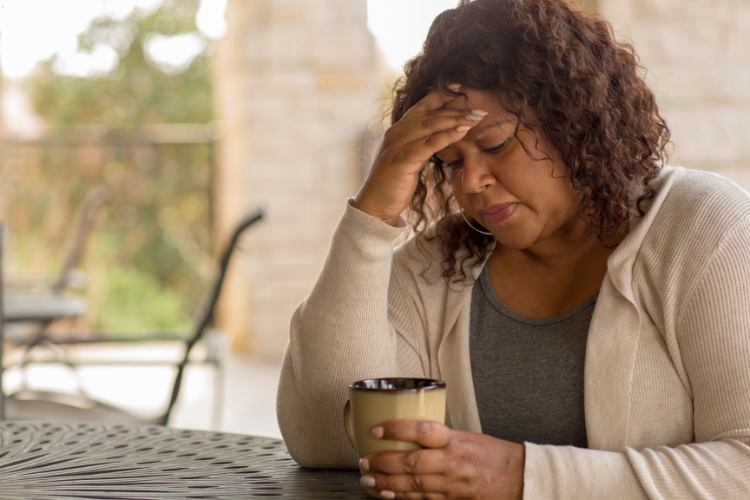Women’s mental health is more than the presence or absence of a mental illness. It encompasses a holistic understanding of well-being that considers emotional, psychological, and social factors.
It’s about achieving balance in our lives, maintaining cognitive function, managing our emotions effectively, and adapting to life’s changes.
A woman’s overall well-being and contentedness are directly tied to her mental health. Sadly, we are facing a global mental health crisis, and girls and women are bearing a disproportionate burden.
Recognizing the importance of women’s mental health and taking action to address this crisis is crucial.
Key Takeaways:
- Women face unique mental health challenges shaped by societal norms and expectations, including higher rates of depression, anxiety, trauma, eating disorders, and substance use disorders.
- Addressing the mental health crisis for women requires a multifaceted approach that acknowledges the intersection of gender and race, addresses systemic barriers to access, and creates supportive environments.
- Employers play a crucial role in fostering mentally healthy workplaces through inclusive policies, parental leave support, and resources for domestic violence survivors.
- Collective care and healing justice principles are essential for supporting the mental well-being of advocates and activists working for gender equality.
- Businesses can contribute positively by promoting mental health in the workplace, challenging harmful stereotypes in advertising, and supporting community-based mental health organizations.
- Empowering women through self-care strategies, such as lifestyle changes, emotional regulation skills, and cultivating a positive mindset, can help protect and enhance their mental well-being.
- Addressing the mental health crisis affecting women requires a collaborative effort from all sectors of society to create a world where every woman can thrive emotionally, mentally, and socially.

The Gendered Experience of Mental Health
While mental health is a global concern affecting all genders, girls, and women experience mental health challenges in ways shaped by societal norms and expectations. While recognizing biological differences, it’s essential to avoid reinforcing harmful stereotypes.
Here are some of the mental health challenges that disproportionately affect women:
1. Depression
Women are twice as likely as men to experience depression at some point in their lives. Several factors contribute to this disparity, including:
- Hormonal Changes: Fluctuations in hormone levels during menstruation, pregnancy, and menopause can increase the risk of depression.
- Societal Pressures: Women often face intense societal pressure to conform to specific roles and expectations, which can lead to stress, anxiety, and depression.
- Genetic Factors: Research suggests that there may be genetic differences between men and women that influence vulnerability to depression.

2. Anxiety
Like depression, women are twice as likely as men to experience anxiety. Contributing factors include:
- Societal Expectations: Women are frequently expected to juggle multiple roles (career, family, caregiver), leading to increased stress and anxiety.
- Biological Factors: Testosterone, a hormone typically found in higher levels in men, may have anti-anxiety and antidepressant benefits.

3. Trauma
Women and children are often the majority of those exposed to violence, conflict, displacement, and natural disasters, making them more vulnerable to trauma and PTSD.
One in three women will experience gender-based violence in their lifetime, adding another layer of risk. The constant need to prioritize safety and navigate potential threats can significantly impact mental well-being.
- Healing Justice: Addressing the mental health crisis among women requires acknowledging the impact of trauma and integrating healing justice principles into support systems.
- Trauma-Informed Approaches: Services and interventions for women must be trauma-informed, recognizing the prevalence of trauma and its potential effects on mental health.

4. Eating Disorders
Eating disorders are significantly more common in women than in men. These disorders, characterized by obsessive thoughts and behaviors related to food, body weight, and appearance, are often fueled by:
- Societal Beauty Standards: The media and social media frequently promote unrealistic beauty standards, contributing to body image issues and pressure to conform.

5. Suicide
While men are more likely to die by suicide, women are more likely to attempt suicide. This discrepancy highlights the complexity of understanding suicide statistics and the need for gender-specific prevention strategies.
6. Substance Use Disorders
Women face unique challenges with substance use, including:
- Biological Differences: Differences in brain chemistry may impact how women respond to substances and make it harder to quit.
- Societal Stigma: Women often experience greater stigma related to addiction, making them less likely to seek help.
- Caregiving Responsibilities: Difficulty accessing treatment due to childcare or eldercare responsibilities can present a significant barrier for women.

Addressing the Mental Health Crisis: A Multifaceted Approach
Effectively addressing the mental health crisis among women requires a multifaceted approach that acknowledges the interplay of various factors and promotes comprehensive solutions.
1. Recognizing the Intersection of Gender and Race
It is vital to recognize that race is a significant factor in mental health, and the experience of racial discrimination can compound mental health challenges for women, especially those from marginalized communities.
2. Addressing Barriers to Access
Women face numerous barriers when trying to access mental health care. These obstacles include:
- Economic Factors: Financial constraints and difficulty taking time off work can make it challenging for women to afford treatment or attend appointments.
- Childcare Responsibilities: The lack of affordable and accessible childcare options often prevents women from seeking the help they need.
- Stigma: Ongoing stigma surrounding mental health issues, particularly for women, can discourage them from seeking help or disclosing their struggles.

3. Creating Supportive Environments
Promoting women’s mental well-being requires creating supportive environments at work, home, and in the community.
A. Workplace Support
Employers play a crucial role in fostering mentally healthy workplaces by providing:
- Safe and Inclusive Spaces: Creating a culture that values mental health and supports employees’ well-being.
- Parental Leave Policies: Implementing equitable parental leave policies to support women during the transition to motherhood and address potential mental health challenges.
- Support for Domestic Violence Survivors: Providing resources and assistance to employees experiencing domestic violence.
B. Collective Care and Healing Justice
Supporting activists and advocates who work tirelessly for gender equality is essential. This involves:
- Acknowledging Lived Experiences: Recognizing that many advocates have personal experience with the traumas they are working to address.
- Providing Trauma-Informed Support: Offering care and resources that are sensitive to the impact of trauma.
- Prioritizing Collective Care: Fostering a culture of support and shared responsibility within movements to prevent burnout and promote sustainability.
C. Engaging the Private Sector
Businesses can contribute to positive change by:
- Promoting Mental Health in the Workplace: Implementing policies and programs that prioritize employee well-being.
- Challenging Harmful Stereotypes in Advertising: Avoiding the perpetuation of harmful stereotypes that can negatively impact women’s mental health.
- Supporting Community-Based Organizations: Providing financial and other resources to organizations that address women’s mental health needs.
4. Harnessing the Power of Social Media
Social media can have both positive and negative impacts on mental health, particularly for young girls. It’s essential to:
- Address Online Harassment and Bullying: Taking action to combat online harassment and bullying, which can have severe consequences for mental health.
- Promote Positive Content and Role Models: Encouraging the creation and sharing of positive content that promotes self-esteem, body positivity, and healthy coping mechanisms.
- Encourage Responsible Social Media Use: Educating young people about the potential risks of social media and promoting healthy habits, such as setting time limits and being mindful of content consumption.

Empowering Women Through Self-Care and Prevention
Individual women can take proactive steps to protect and enhance their mental well-being through:
1. Lifestyle Changes
- Regular Exercise: Engaging in physical activity, which has proven benefits for mental health.
- Balanced Diet: Nourishing the body with a balanced and healthy diet.
- Stress-Reducing Activities: Practicing relaxation techniques like mindfulness or yoga.
- Prioritizing Sleep: Ensuring adequate sleep to support emotional and mental well-being.
2. Emotional Regulation Skills
- Mindfulness: Paying attention to thoughts and feelings without judgment.
- Cognitive Behavioral Therapy (CBT) Techniques: Identifying and challenging negative thought patterns.
- Seeking Professional Help: Reaching out to therapists or counselors when needed.
3. Cultivating a Positive Mindset and Purpose
- Defining personal values
- Setting healthy boundaries
- Prioritizing self-care
Conclusion
The mental health crisis affecting girls and women demands immediate and sustained attention.
By understanding the unique challenges women face, addressing systemic barriers, creating supportive environments, and empowering women through self-care, we can make significant strides in improving their mental well-being.
We must all commit to creating a world where every woman has the opportunity to thrive emotionally, mentally, and socially. It is crucial to remember that mental health challenges are treatable, and recovery is possible with the right support and resources.
FAQs
1: What are the common mental health challenges faced by women?
Answer: Women often face unique mental health challenges, including higher rates of depression, anxiety, trauma, eating disorders, and substance use disorders. Factors contributing to these issues include hormonal changes, societal pressures, and the prevalence of gender-based violence.
2: How can women support their mental health effectively?
Answer: Women can enhance their mental health by:
- Engaging in regular exercise and maintaining a balanced diet.
- Practicing stress-reducing activities such as mindfulness or yoga.
- Prioritizing adequate sleep.
- Developing emotional regulation skills through techniques like cognitive behavioral therapy (CBT).
- Seeking professional help when needed and cultivating a positive mindset.
3: What role do societal factors play in women’s mental health?
Answer: Societal factors significantly impact women’s mental health. Women often encounter pressures to conform to specific roles, face discrimination, and experience stigma related to mental health issues. These factors can lead to increased stress, anxiety, and depression, making it crucial to address systemic barriers and create supportive environments.
4: How can employers contribute to women’s mental health in the workplace?
Answer: Employers can foster mental well-being by:
- Creating safe and inclusive work environments that prioritize mental health.
- Implementing equitable parental leave policies.
- Providing resources and support for employees experiencing domestic violence.
- Promoting mental health awareness and offering programs that support employee well-being.

